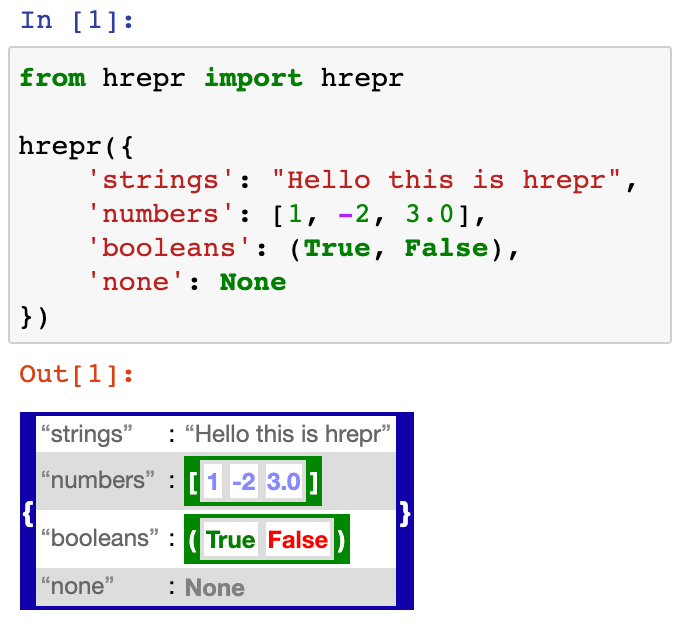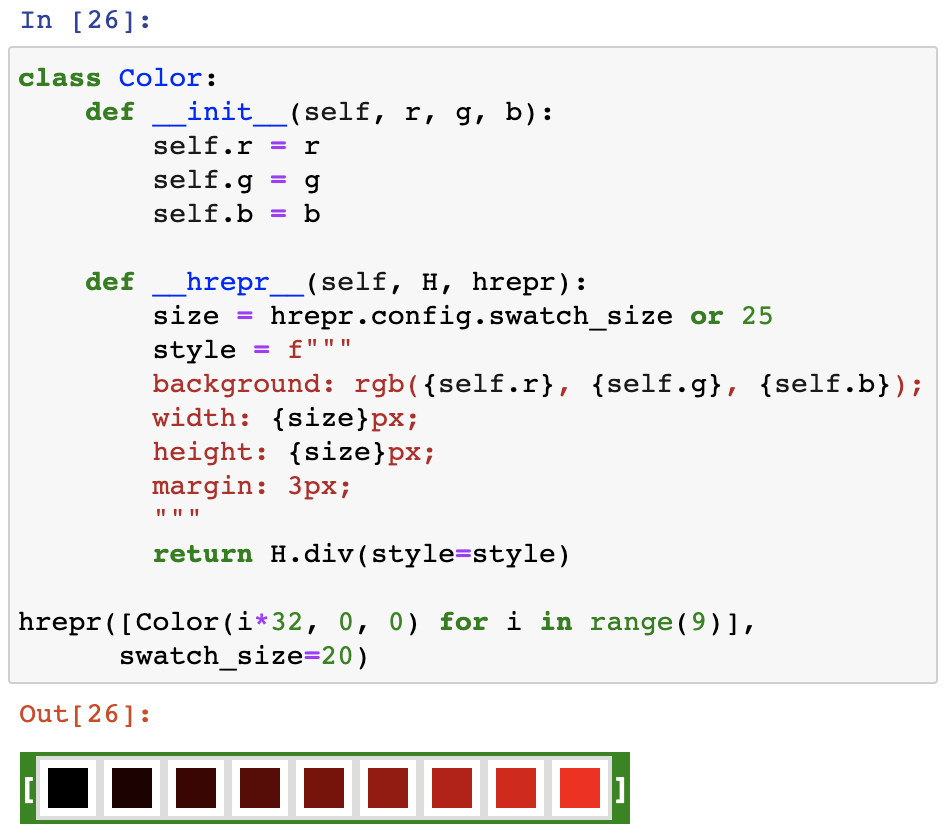Extensible HTML representation for Python objects.
Project description
hrepr is a package to create an HTML representation for Python objects. It can output to Jupyter Notebooks and it can also generate standalone pages with the representation of choice objects.


See the examples.ipynb notebook for more examples, but keep in mind that GitHub doesn’t display it properly.
Install
hrepr requires at least Python 3.6
$ pip3 install hreprUsage
from hrepr import hrepr
obj = {'potatoes': [1, 2, 3], 'bananas': {'cantaloups': 8}}
# Print the HTML representation of obj
print(hrepr(obj))
# Wrap the representation in <html><body> tags and embed the default
# css style files to produce a standalone page.
print(hrepr(obj).as_page())In a Jupyter Notebook, return hrepr(obj) directly.
Custom representations
A custom representation for an object can be defined using the __hrepr__ method on the object, and if necessary, an __hrepr_resources__ method on the class. No dependency on hrepr is necessary:
class RedGreen:
def __init__(self, r, g):
self.r = r
self.g = g
@classmethod
def __hrepr_resources__(cls, H):
return H.style('''
.red { background-color: red; }
.green { background-color: green; }
''')
def __hrepr__(self, H, hrepr):
return H.div(
H.div['red'](hrepr(self.r)),
H.div['green'](hrepr(self.g))
)__hrepr__ receives two arguments:
H is the HTML builder, which has the simple interface: H.tag['klass', ...](child, ..., attr=value, ...) to create the tag <tag class=klass attr=value>child</tag>. You can add more classes, attributes and children, i.e. it is legal to write H.a['cls1'](href='blah')['cls2']('hello', attr=value)
Use H.raw(string) to insert an unescaped string (e.g. literal HTML)
Use H.inline(...) to concatenate the children without wrapping them in a tag.
hrepr is a function that can be called recursively to get the representation of the object’s fields.
__hrepr_resources__ is optional, but if it is defined, it should return one or a list of tags that should be inserted in the <head> section of the page in order to properly format the representation. These can be <style> tags, <script> tags, or <link> tags.
__hrepr_short__ is also optional, and should return a representation that has a constant (small) size, e.g. the value of a class’s name field, the length of the array, or something or other.
Configure the representation
hrepr can take an arbitrary number of keyword arguments. Some of them are treated specially, whereas others are stashed in the hrepr object passed to __hrepr__ methods and may be used to implement custom display options on custom elements. The following keys are special (examples of their use can be found in the examples.ipynb notebook):
max_depth limits how many layers of nested objects will be displayed. Past that depth, objects are represented with their __hrepr_short__ method.
type_handlers maps one or more types to functions with signature (obj, H, hrepr) -> Tag which are used to generate the HTML structure to display. These handlers override __hrepr__.
type_handlers_short: same, but for short representations.
resources is one or a list of functions with signature (H,) -> [Tag], meaning that they take the H constructor and return one or more style or script or link tags that are globally needed.
preprocess is a function with signature (obj, hrepr) -> obj. It must return an alternative object to display instead of obj.
postprocess is a function with signature (obj, tag, H, hrepr) -> Tag. It must return an alternative or modified Tag object to display. For example, it could return tag['highlight'] which is the syntax to add the 'highlight' class to a Tag, in which case the postprocessor is ostensibly highlighting the corresponding object. If the postprocessor returns None, the object will be represented by tag, as it would be if there was no postprocessor.
Custom hrepr
You can also customize the hrepr function by subclassing the HRepr or StdHRepr classes (the difference between the two is that the latter defines default representations for several Python types like list or dict whereas the former does not).
Your subclass can override the following functions and fields:
global_resources(H) should return one or a list of tags to insert in <head>.
__default_handlers__() should return a dict that associates types to handlers with the signature handler(obj, H, hrepr). When given an object of a certain type, hrepr will look for it there first.
__call__(obj) is the main representation function, and will be called recursively for every object to represent.
from hrepr import StdHRepr
class MyRepr(StdHRepr):
def __default_handlers__(self):
dh = super().__default__handlers__()
return {**dh, int: self.repr_int}
def global_resources(self, H):
return H.style(".my-integer { color: fuchsia; }")
def repr_int(self, n, H, hrepr):
return H.span['my-integer']('The number ', str(n))
def myrepr(obj):
# Call hrepr_with_resources to attach the resources to the
# return value, otherwise .as_page() will not work as
# intended.
return MyRepr().hrepr_with_resources(obj)
print(myrepr(10)) # <span class="my-integer">The number 10</span>
print(myrepr(10).as_page()) # This will include the styleProject details
Release history Release notifications | RSS feed
Download files
Download the file for your platform. If you're not sure which to choose, learn more about installing packages.











